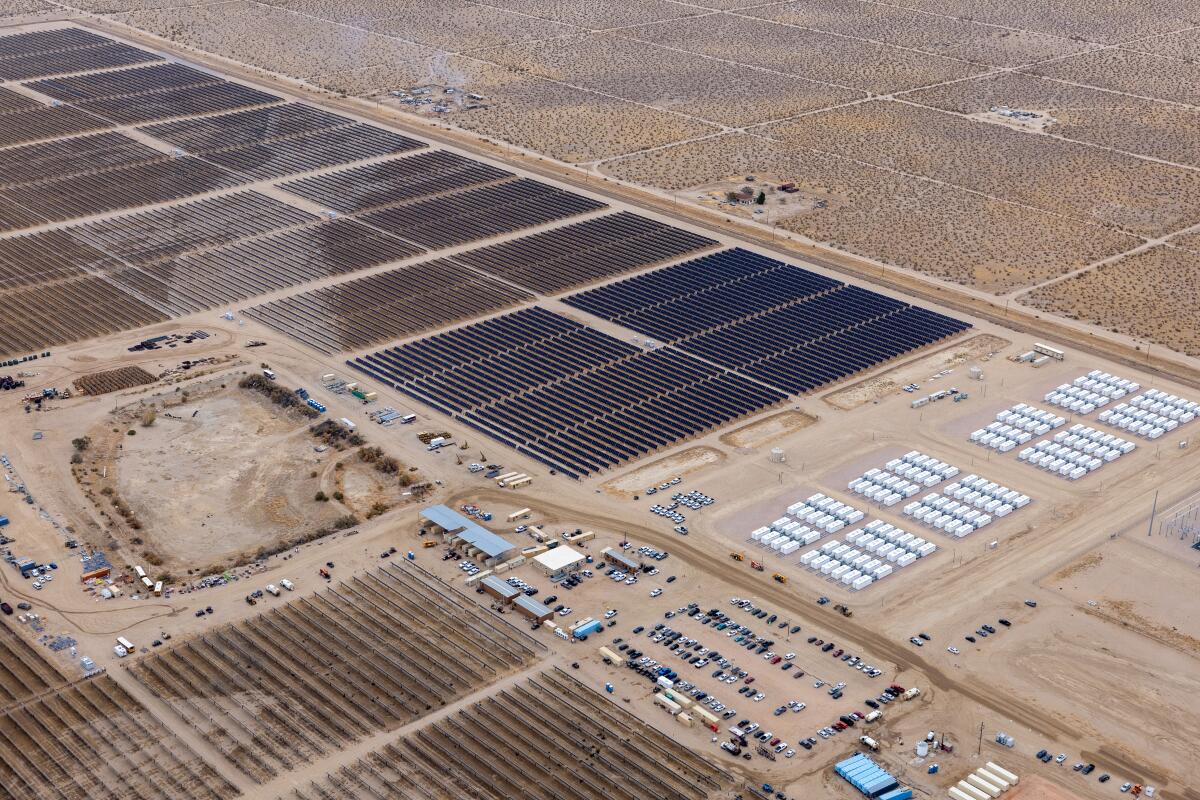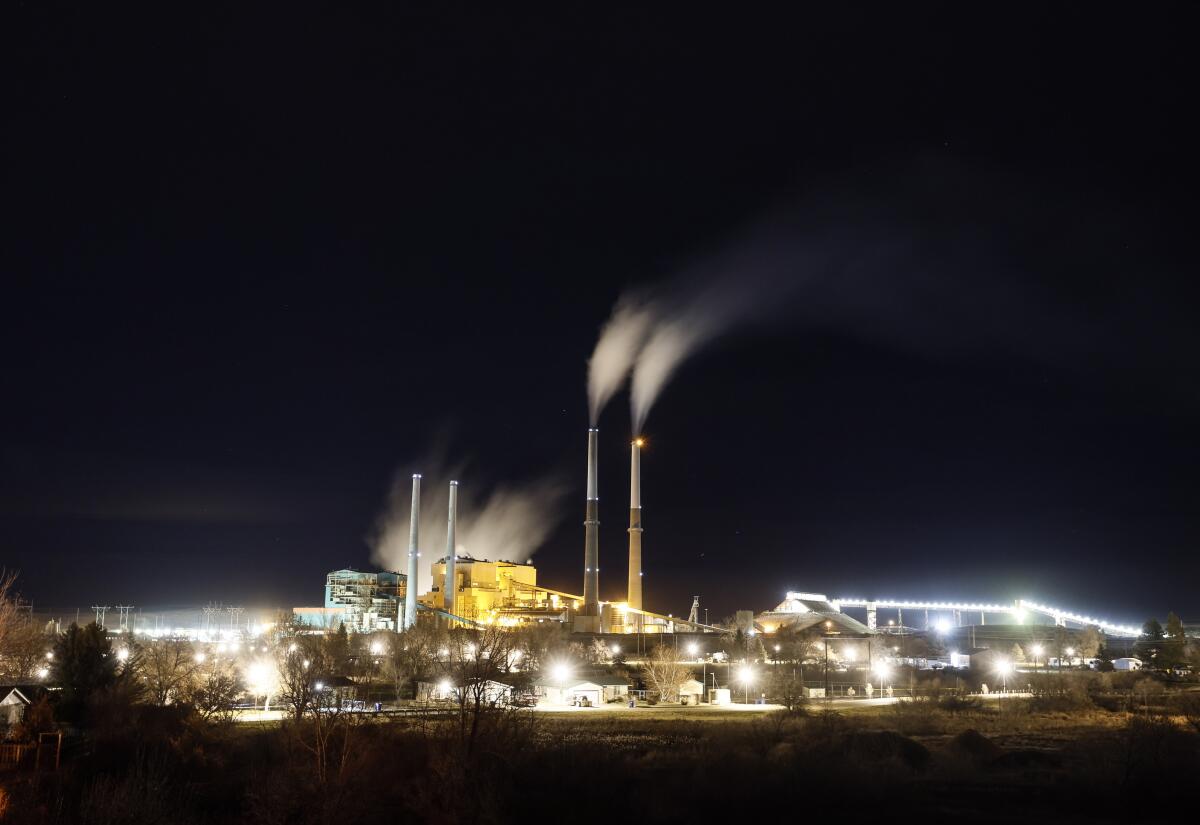Boiling Point: Trump loves coal. Lithium-ion batteries, maybe not

- Share via
I didn’t know much about email newsletters when Sarah Day Owen, an editor at the Desert Sun in Palm Springs, asked if I would start writing a weekly guide to all things energy and water. But it sounded fun and useful. And so the Current was born. Nearly 10 years later, I’m still writing weekly news roundups, now for the L.A. Times.
Don’t worry, Boiling Point isn’t ending. You’ll still get my columns in your inbox every Thursday.
But we are ending the Tuesday news roundups. Reading and analyzing so many news stories every week takes up an enormous amount of time and energy. Especially now that we’ve launched the Boiling Point podcast — which I hope you’ll listen to! — I’ve gotten pretty overextended. I’m a human being, not a robot.
I’m looking forward to focusing more fully on producing a deeply reported column and an engaging podcast each week. And I’m planning to start writing occasional columns outside of the Thursday newsletter schedule.
You're reading Boiling Point
Sammy Roth gets you up to speed on climate change, energy and the environment. Sign up to get it in your inbox twice a week.
You may occasionally receive promotional content from the Los Angeles Times.
Thank you as always for following my journalism and the work produced by my amazing colleagues on the L.A. Times’ Climate California team. Although no media outlet is perfect, there’s no healthy future for this country, or this planet, without a vibrant press, supported by engaged, thoughtful news consumers.
Feel free to follow me on Bluesky, where I’ll continue to share stories from the L.A. Times and other outlets.
On that note, here’s what’s happening around the West:
THE ENERGY TRANSITION

Remember last month, when the Trump administration told polluting companies they could email the U.S. Environmental Protection Agency to ask for temporary exemptions from the Clean Air Act?
Well, the nation’s most polluting coal plant, Montana’s Colstrip plant, has asked the EPA for an exemption, as the New York Times’ Hiroko Tabuchi reports. I’ve followed Colstrip closely since visiting the facility in 2023. It supplies power to the Pacific Northwest and is the only U.S. coal plant that lacks modern air pollution controls.
I’d expect the EPA to grant the exemption. A sampling of the administration’s latest environmental actions:
- Federal officials are preparing to yank funding from hundreds of clean energy projects, the vast majority of them in blue states, even though the money was approved by Congress. (Hayley Smith, L.A. Times)
- The Trump administration claims gutting environmental protections is good for the economy. New analyses focused on public health and premature deaths show that the opposite is true. (Hayley Smith, L.A. Times)
- President Trump’s tariffs are expected to drive up costs for all types of energy development — clean energy and fossil fuels. But they could be especially harmful for solar and wind, experts say. (New York Times)
Some of the worst consequences of Trump’s tariffs could fall on lithium-ion batteries, a crucial technology for electric car batteries and renewable energy storage. Lithium-ion batteries are uniquely vulnerable because most of them are currently imported to the U.S. — primarily from China, as the New York Times’ Brad Plumer reports.
Even before the tariffs, the economic uncertainty created by the Republican Party’s hostility to anything climate-adjacent was beginning to torpedo a potential engine of job growth. More electric vehicle manufacturing facilities producing lithium-ion batteries, car parts and critical minerals were canceled in the first quarter of 2025 than in the previous two years combined, per the Washington Post’s Shannon Osaka.
A few congressional Republicans, representing districts where lithium and EVs are already creating jobs and tax revenues, say they won’t vote to roll back tax incentives approved by Congress under former President Biden. One of those Republicans is Nevada Rep. Mark Amodei, as the Nevada Independent’s Gabby Birenbaum writes.
I’ll be doing some reporting on lithium mining in Nevada soon. Stay tuned for that.
A few more energy stories:
- Ten years after an oil spill off the Santa Barbara coast, a company is trying to bring three platforms back into production, against the repeated demands of the California Coastal Commission. (Grace Toohey, L.A. Times)
- A startup wants to build a $5.5-billion data center campus, powered by round-the-clock, climate-friendly geothermal energy, near the southern shore of California’s Salton Sea. (Janet Wilson, Desert Sun)
- The Trump administration’s Department of Health and Human Services, led by Robert F. Kennedy Jr., fired the entire staff of a program that provides utility bill assistance to 6 million low-income households, helping them pay their bills — and perhaps even stay alive — when it’s very hot or very cold. (Medora Lee, USA Today)
President Trump’s appointees have framed their battle with climate scientists and advocates as a kind of savage struggle, with EPA Administrator Lee Zeldin saying recently that his agency is “driving a dagger through the heart of climate-change religion.” Faith leaders who have dedicated themselves to fighting climate change were, understandably, taken aback by his choice of words, per James Bruggers at Inside Climate News.
You might recall I wrote last year about Jewish organizations campaigning for fossil fuel divestment.
ON THE LANDSCAPE

Be sure to check out Al Seib’s photos of the first soil being laid on the world’s largest wildlife crossing, over the 101 Freeway in Agoura Hills. Images here, with a story by my L.A. Times colleague Jeanette Marantos.
Elsewhere in Los Angeles County, the fallout from the January wildfires continues:
- “The death of 17 people [from the Eaton fire] in Altadena has shone a spotlight on L.A. County’s struggle to plan for the evacuation of elderly and disabled.” If you ask me, this is yet another example of climate change hitting society’s most vulnerable the hardest. (Jennie Jarvie, Terry Castleman and Summer Lin, L.A. Times)
- Actually, make that the death of 18 people. Another Eaton fire victim was found. (Jenny Jarvie, L.A. Times)
- If you hike in wildfire burn scars in the San Gabriel Mountains, beware the poodle-dog bush. It’s like poison ivy, but potentially worse. The purple flowers do look nice, though. (Lila Seidman, L.A. Times)
On a related noted, Cal Fire just finished adding nearly 6 million acres of California to fire hazard zones. Do you live in one of those zones, and if so, what do the designations mean for you and your home? Here’s a detailed explainer from The Times’ Noah Haggerty, Sean Greene and Sandhya Kambhampati.
In the water arena, things are looking pretty good for California right now. For the first time in a quarter-century, we’ve had three straight years of near-average or above-average snow in the Sierra Nevada, The Times’ Ian James writes. Southern California has a record amount of water banked in reservoirs and underground.
The longer-term picture is hazier due to climate change. A few snapshots of the conflicts on the horizon:
- Gov. Gavin Newsom’s office is badgering state regulators to grant a key authorization to an environmentally controversial water tunnel in the Sacramento-San Joaquin River Delta. (Ian James, L.A. Times)
- One of the few reservoir expansion projects in California not opposed by environmentalists could be derailed by a disagreement over paying for highway seismic upgrades. (Kurtis Alexander, San Francisco Chronicle)
- Wastewater recycling could help reduce reliance on the chronically overtapped Colorado River. But California and other states aren’t recycling nearly enough, per a new report from UCLA. (Ian James, L.A. Times)
Speaking of which, the Trump administration denied a routine request to send Colorado River water to a parched Tijuana, breaking with long-standing U.S. practice. Details here from Voice of San Diego’s Sandra Dibble.
Meanwhile, on America’s public lands:
- Trump’s Interior secretary, Doug Burgum, has ordered all national parks to remain open, no matter what — even after the mass firing of National Park Service workers. (Hannah Wiley, L.A. Times)
- Top staffers for Burgum, a wealthy entrepreneur and former North Dakota governor, have reportedly asked political appointees at Interior to learn to bake cookies for Burgum and his guests, and to act as servers for a multicourse meal, among other unusual demands. (Michael Scherer and Ashley Parker, the Atlantic).
- Senate Republicans rejected a measure that would have blocked public lands from being sold off to reduce the federal deficit — possibly making it easier to use public-land sales to pay for an extension of Trump’s tax cuts. (Chris D’Angelo and Roque Planas, Public Domain)
Last but not least, a new directive from U.S. Agriculture Secretary Brooke Rollins could open huge swaths of national forest in Southern California to logging. Here’s the story from the Desert Sun’s Janet Wilson.
ONE MORE THING

Safe street advocates are accusing L.A. County of violating a voter mandate by refusing to upgrade bike lanes on Vermont Avenue. The county’s Metropolitan Transportation Authority, a.k.a. Metro, says it doesn’t have to comply, as my colleague Colleen Shalby reports, because the mandate was passed by L.A. city voters, and Metro is a county agency. Even though the stretch of Vermont Avenue in question runs through the city of L.A.
People ask me all the time how they can help with climate change at a local level. This is a good example. Even if you don’t bike, lots of people do. When local officials — and the politicians who appoint them — refuse to make it easier for people to cycle safely, they’re impeding climate progress.
If you think that’s unfortunate, you can speak out.
This is the latest edition of Boiling Point, a newsletter about climate change and the environment in the American West. Sign up here to get it in your inbox. And listen to our Boiling Point podcast here.
For more climate and environment news, follow @Sammy_Roth on X and @sammyroth.bsky.social on Bluesky.
Toward a more sustainable California
Get Boiling Point, our newsletter exploring climate change, energy and the environment, and become part of the conversation — and the solution.
You may occasionally receive promotional content from the Los Angeles Times.




